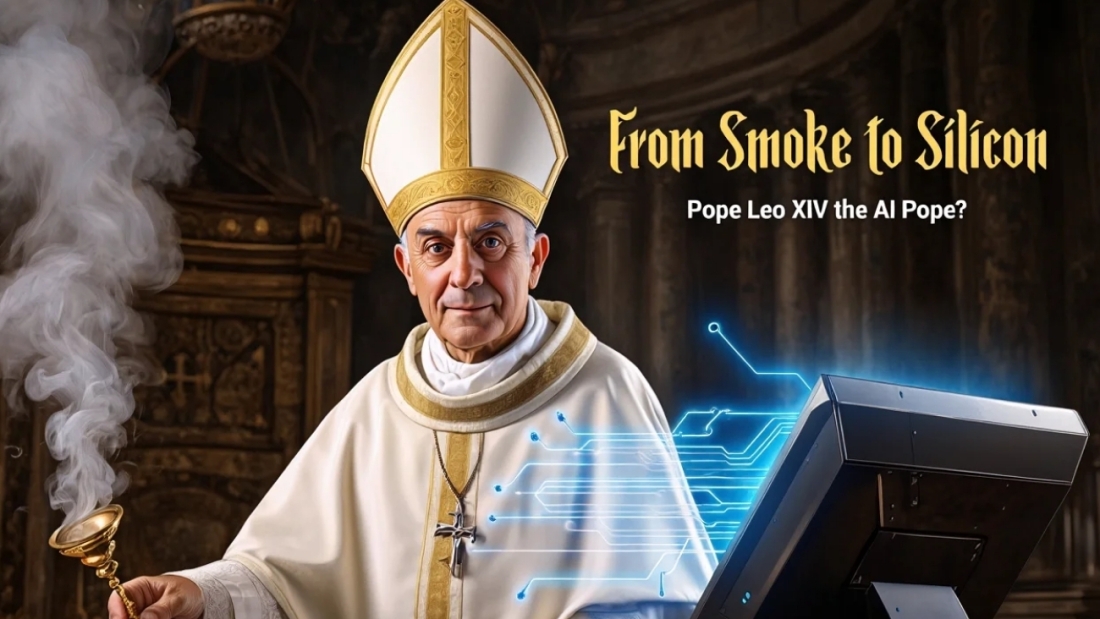In 1891, Pope Leo XIII issued Rerum Novarum a groundbreaking encyclical that addressed the sweeping changes brought on by the Industrial Revolution. At a time when machines were transforming economies and displacing traditional labor, Leo XIII didn’t retreat into doctrine. Instead, he engaged with modernity. He outlined the Catholic Church’s stance on workers’ rights, the dignity of labor, the importance of private property, and the moral limits of capitalism. It was a defining moment not only for the Church, but for how faith could shape public discourse in a time of radical change.
In May 2025, history may have quietly begun to rhyme. The election of Pope Leo XIV, the first American to hold the office, signaled more than a demographic shift. His choice of name Leo was a deliberate echo of the pope who guided the Church through the machine age. But this time, the machines aren’t powered by steam they’re driven by data. And the crisis is not industrial it’s intellectual, ethical, and existential.
Pope Leo XIV explains why he chose the name
— The Post Millennial (@TPostMillennial) May 11, 2025
pic.twitter.com/jQFFLjEcZm
A New Age, A New Leo
The Industrial Revolution disrupted labor, restructured cities, and concentrated power in new ways. Artificial Intelligence promises to do the same perhaps faster, deeper, and with even less understanding of its consequences. Pope Leo XIV inherits a Church situated in a world defined by algorithms, automation, and the looming specter of Artificial General Intelligence (AGI). If Leo XIII’s question was how to protect the worker in an age of machines, Leo XIV’s might be: how do we protect the human in an age of thinking machines?
So far, Leo XIV has said little publicly about AI. But his choice of name is already a message. It points toward a papacy that may not only engage with the technological revolution underway but attempt to shape it.
Leo XIII and Rerum Novarum
To understand what might come next, it’s worth revisiting what Leo XIII achieved. Rerum Novarum was revolutionary in its own way. It defended the right to private property, but also emphasized the obligations of the wealthy to the poor. It affirmed the role of the state in regulating working conditions and wages. This introduced the idea that faith should not retreat from modern life but offer an ethical foundation for navigating it.
Most importantly, it challenged the notion that economic or technological progress could be measured solely in material terms. Human dignity, Leo XIII insisted, had to remain at the center.
Old photo of Pope Leo XIV in Chicago resurfaces online 📸 pic.twitter.com/9SjtSELK6r
— Daily Noud (@DailyNoud) May 12, 2025
Toward a New Encyclical?
If Leo XIV were to take up this mantle for the digital age, what might his version of Rerum Novarum look like?
We can only speculate, but a few themes seem inevitable:
Human uniqueness in the face of synthetic intelligence. As AI models increasingly simulate creativity, language, and even emotion, the Church may be called to reaffirm what separates man from machine perhaps not intelligence, but soul.
A moral framework for automation. As entire industries automate away labor, the Church could once again serve as a voice for those left behind. Who benefits from AI? Who is displaced by it? And how should society care for those it renders economically obsolete?
Guardrails for AGI. The development of Artificial General Intelligence raises theological and ethical questions with few precedents. If a machine one day claims sentience how should we respond? Can something artificial be treated as a moral agent?
A response to simulated faith. With AI-generated sermons, chatbots posing as religious counselors, and virtual spirituality on the rise, the Church may need to draw clear lines between authentic faith and digital imitation.
Facts about Pope Leo XIV
— 𝐓𝐡𝐞 𝐀𝐫𝐭 𝐨𝐟 𝐏𝐮𝐫𝐩𝐨𝐬𝐞 🇺🇸 (@creation247) May 10, 2025
>IQ: 145
>Speaks 7 languages
>Former professor
>Degrees in mathematics & theology
>Missionary in Peru for +10 years
>First American Pope
>Known for humility and intellectual capabilities
This isn’t just a Pope
This is one of the smartest men alive pic.twitter.com/4BCqWdqEqo
The Role of the Church in an Age of Acceleration
Throughout history, the Catholic Church has acted as both a preserver of tradition and a respondent to change. It does not move quickly but when it speaks, it often speaks for centuries. Leo XIII laid a foundation for Catholic social teaching that still echoes today.
Leo XIV has the opportunity to do the same for the age of AI. Whether through a formal encyclical or sustained moral leadership, his papacy will likely coincide with the moment when humanity confronts the boundaries of intelligence, consciousness, and what it means to be human.
If Leo XIII stood at the gates of the factory and called for justice, Leo XIV may soon find himself standing at the gates of the server farm calling not just for caution, but for conscience.
Because the question is no longer just how machines work.
It’s who we will become as they begin to think.



Leave A Comment